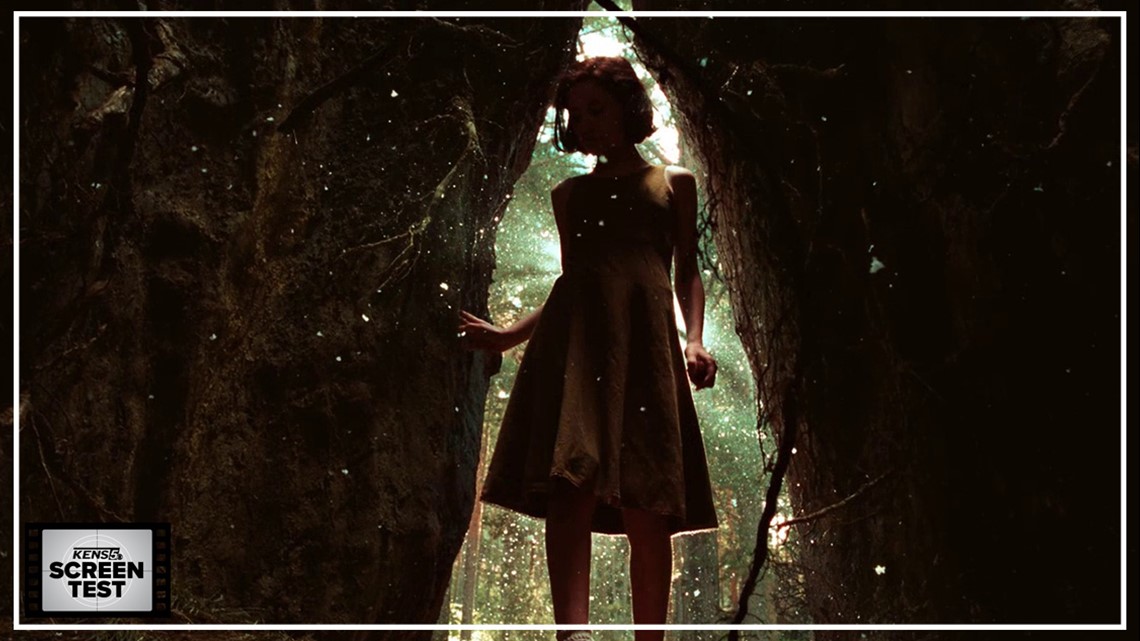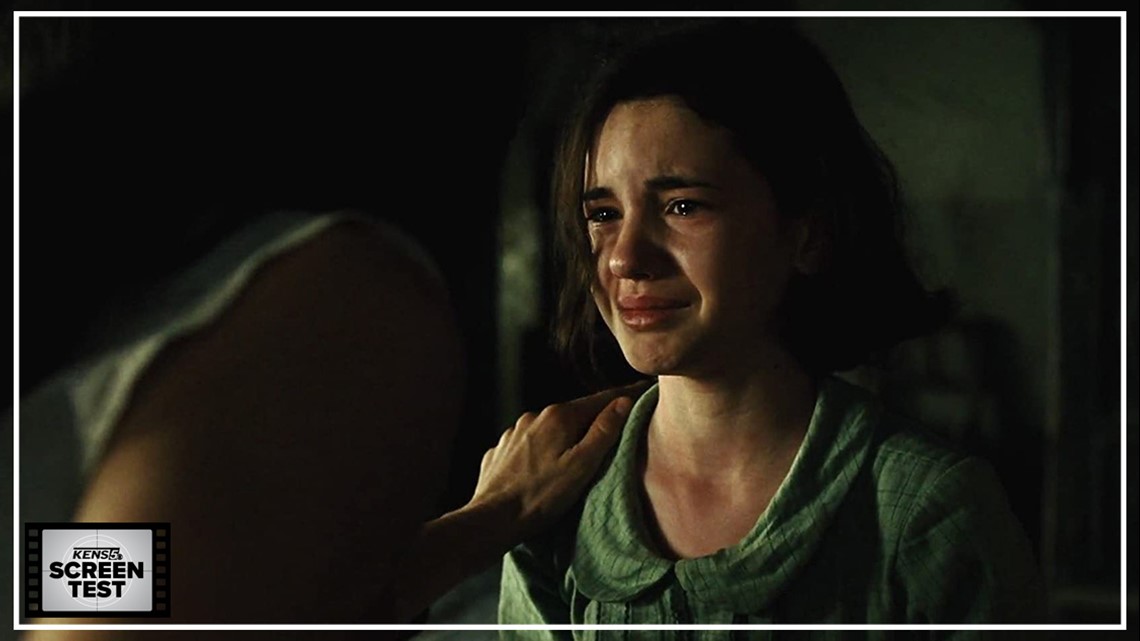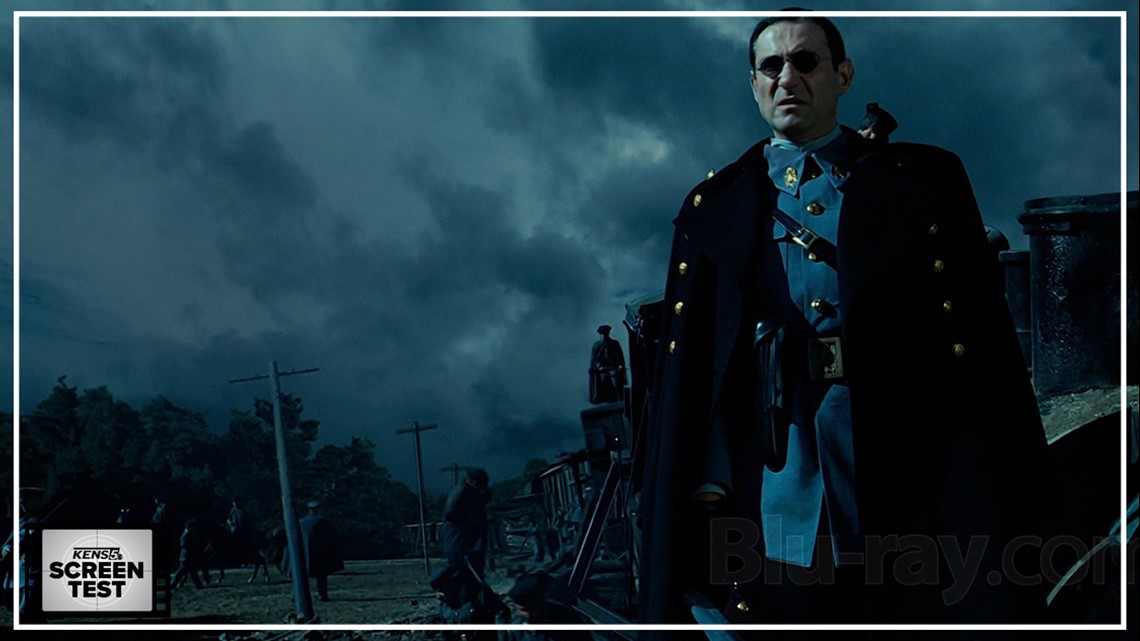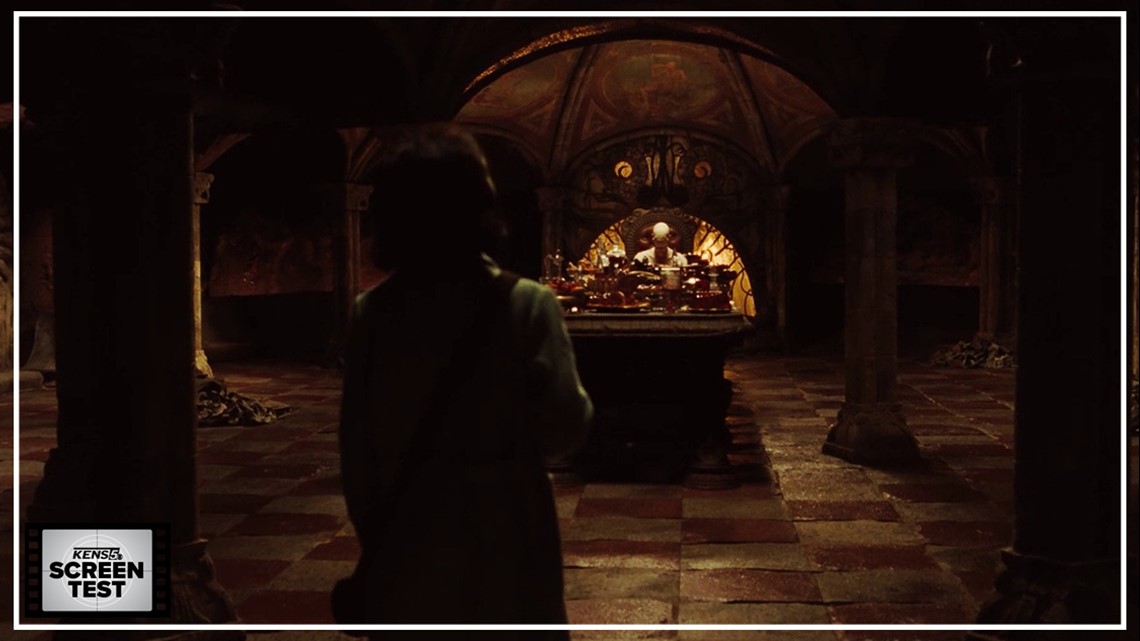Major spoilers for “Pan’s Labyrinth” follow
“This movie almost destroyed me,” Guillermo del Toro confesses in his director’s message on the home video release of his 2006 masterpiece “Pan’s Labyrinth" (“El laberinto del fauno” in the film’s native language). The statement is a bit startling for an auteur whose appeal is measured in the sheer confidence he holds in the beauty of his strange creations.
The words make more sense after you’ve seen the film. If there’s one trait that’s endured in the Mexican filmmaker’s nearly-20-year career of feature-length stories about monsters and passions, netherworlds and inner struggle, it’s how personal his movies seem to be; his emphasis on flawed characters, practical effects and melancholy via violence are the first indications. There isn’t always triumph for his protagonists, but we’re not usually left with a sense of ambiguity either. In that regard, “Pan’s Labyrinth” remains del Toro’s greatest work because it remains his greatest act of artistic compromise—the story is as much about the search for escape amid crisis as it is about the bittersweet acknowledgement that searching might not yield answers. That also makes it painfully relevant in 2020.
“Pan’s Labyrinth” centers on Ofelia (Ivana Baquero), a young girl bordering on the age of difficult epiphanies navigating a cruel world of adults who have had decades to make peace with how they would respond to their own. Political tensions are bubbling over in the forest countryside of mid-1940s Spain, where Ofelia is going with her pregnant mother, Carmen (Ariadna Gil), to live with her new husband, the sadistic Captain Vidal (Sergi Lopez) while he is hard at work stomping out remaining resistance fighters hiding in the surrounding woods (The movie’s uber-narrow scope makes it seem like they’re the last humans battling over a desolate Earth).
There’s no indication of where Ofelia and Carmen are coming from, who or what they might be leaving behind as they’re driven through these woods that feel suspended in time. And there won’t be any explanation of backstory (aside from Carmen’s explaining how her first spouse died in the war). Between the foundational loneliness, a hint of disconnect between her and her exhausted mother, and the rude non-welcome welcome by the man she’s told she must now call “father,” del Toro makes it characteristically clear early on why Ofelia would indulge in her wanderings of the forest and of the mind, leaving the viciousness of adult squabbles behind.


But in those ostensibly escapist wanderings – as she confronts increasingly strange beings and carries out a set of tasks she’s assigned by a friendly faun – she only becomes more entrenched in meddling with the fascist forces for whom violence is routine, inevitably coming face-to-face with the barrel of the gun. In that vein, “Pan’s Labyrinth” is the premiere paradoxical fantasy of the current century—the surreal becomes increasingly of apiece with the familiar until they’re tragically inseparable.
I’d been planning to revisit “Pan’s Labyrinth” for a few weeks now; continuing guidance from health officials to practice social distancing amid an ongoing pandemic means inevitably circling back to films that have lodged themselves in your consciousness over time. del Toro’s movie has certainly been one of those for me, and even if this fairy tale is more along the lines of a dark Grimm Brothers story than 1990s Disney, I was looking forward to the brief escape from an anxious moment in American history.
And yet, as Ofelia befriends chirping forest sprites and avoids becoming the Pale Man’s lunch, I found a different movie than I remembered seeing before. One of the most rewarding things about revisiting movies is when their meanings and messages evolve as we come to them in different stages of life; a new character might demand our sympathies or a bit of dialogue rings of different intentions than we remembered. Where before I empathized with Ofelia as a victim of circumstance when Vidal shoots her after she tries to escape with her baby brother, I now saw her as being aware of the consequences of her actions. Where before I saw a parable on journeys undertaken by the child inside us, I now saw a suggestion that journeys might begin with us as children and end with us having outgrown innocence. Where before I heard in the hums of Javier Navarette’s deliciously simple theme the promise of liberation from reality’s harshness, I now caught a devastating whiff of doubt that what we set out to find might not be there after all.
And, more than ever before, I found myself utterly disarmed by what Carmen insists her daughter realize late in the film when Ofelia tries using a product of fairy tales, a mandrake root, to cure her: “Things are not that simple. You’re getting older—soon you’ll see that life isn’t like your fairy tales. The world is a cruel place, and you’ll learn that. Even if it hurts.” The monologue is both the thesis of del Toro’s film and the very idea he’s working to push back against, even with all its cruelty and bloodshed and neglect for fellow man. Carmen's words are a lesson, but Ofelia's innocence is a tonic.


With “Pan’s Labyrinth,” recontextualizing Ofelia’s story within the framework of current headlines and tweet threads and news reports means finding a movie that’s less about the tragedy of trying to hold onto childhood, as I’d previously seen it, and more about squeezing the final ounces out of unvarnished virtue to face the unpredictability of everything that comes next. All we have to do is look up (or down at our phone screens) to understand what Carmen is talking about. To watch “Pan’s Labyrinth” in the age of COVID-19, outrage against police brutality and superlative economic anxiety is to accommodate ourselves with fresh standards for uncertainty and the surreal developments of a real world. It’s not to wish for Ofelia to remain an innocent child lost in her stories; it’s to realize, as she snatches her brother from Vidal’s lair after her mother has passed, that the destination of her journey must be anything other than giving in to the villainy around her. She goes from a child preoccupied with books to being on equal footing with all the grown-ups towering above her, with just as much agency and just as much to lose.
In a cold opening of sorts, del Toro establishes the more foundational interests on which he’s made his storytelling reputation. It’s a fairy-tale-within-a-fairy-tale about an otherworldly princess who “dreamt of the human worlds, blue skies, soft breeze and sunshine” and craves to be outside (sound familiar?). She escapes, but then dies after “the bright sun blinded her and erased her memory.” Her kingly father, meanwhile, remains waiting for her daughter’s soul to return, “perhaps in another body, in another place, at another time.”
In another clear del Toro-ism, the first time we see Ofelia curiously exploring her wooded surroundings, she stumbles across a small ruin and a massive bug that you’d swear recognizes her from somebody, someplace, sometime. It’s the first time del Toro introduces the unique rush of one of “Pan’s Labyrinth’s” most curious sensations that will return over and over; the suspicion that we, and Ofelia in the film, have not arrived at a place but returned to it, without our being able to recall the past.
It’s a sentimentality few are as effective at creating as del Toro is and it will only be fortified when Ofelia’s explorations leads her to meeting the faun and other creatures that seem to live conspicuously under and around Vidal’s outpost. The Spanish actress Ivana Baquero, just 12 when the movie was released, is remarkable at manifesting the sensation behind her inquisitive eyes.
Could Ofelia be the vessel for the princess’s soul? becomes a natural question and a natural source of drama in del Toro’s screenplay. The (friendlier) natural elements of this world – the faun, the fauna, the sprites, the ruins – don’t at first threaten Ofelia, but act like they’re welcoming her home. If you took a 10-minute evening walk outside earlier this spring, as we were just beginning to stay inside amid COVID-19’s spread through the country, perhaps you felt something similar. And perhaps waiting to return to a largely-still-unspecified state of “normalcy” is a similar feeling to Ofelia wondering about a return to this so-called kingdom the faun keeps going on about. In their first meeting, she accepts the Book of Crossroads – which will detail her tasks – without question. And why not? It’ll give a fanciful mind a fanciful way to pass the time in a cruel place that demands rigid attentiveness.
That surreal relationship in “Pan’s Labyrinth” between the familiar and unfamiliar is increasingly of apiece with our lives as well—as is the arc Ofelia takes as a character. After the totality of what has unfolded this spring – how March strangely felt like a decade, how the last week has felt like a year – we may as well have been as innocent about everything on Jan. 1 as Ofelia is when we first meet her. And if we were innocent at the start of the new year, we’re surely something different now: experienced, grown, fortified. More anxious about what comes next, but also more prepared for its arrival. “Pan’s Labyrinth” may reinforce the idea of adjusting to unprecedented situations, but it’s in that adjustment that characters find a code on which they decide to act.


Take the words of Mercedes (Maribel Verdu), the servant working under Vidal who feels more maternal to Ofelia than Carmen does, and who is secretly bringing food and medical supplies to the anti-fascist fighters under the captain’s nose. She tells Ofelia she too used to believe in fairies: “I believed in a lot of things I don’t believe in anymore.” And yet being guided by a morality that Ofelia finds some shelter in makes Mercedes an avatar for del Toro’s hopes about growth—namely, that we can retain free will in corrupting circumstances.
The editing of “Pan’s Labyrinth,” by Bernat Vilaplana, is one of its most underrated components. Constructed in concert with the gorgeous brutality of Guillermo Navarro’s Oscar-winning cinematography, scenes tend to bleed together through mood and atmosphere and a sense of interwoven consequence. In one shot, the camera moves slowly down through the floor of the bathroom until we’re in the faun’s cave. In another, the camera trucks right to follow Ofelia’s grimy crawl under a tree before cleverly transitioning back outside where soldiers are surveilling under the watch of Vidal (comparisons between the captain – evil and absolute – to the coronavirus can certainly be made). If we assume the real world and fantastical world of “Labyrinth” remain separate like oil and vinegar, this is del Toro’s way of reminding us that actions taken in one place affects affairs in the other. By doing away with laws of geography, del Toro emphasizes the existence of both his worlds in a unified setting. In his review, Roger Ebert called that “one of the scariest elements of the film; they both impose sets of rules that can get an 11-year-old killed.”
Take that technique as a metaphor for humanity, and the director offers up a compass for our consequential times; to navigate a restless world in 2020 will take the best of who we were before and the intent to confront what awaits as people forced to be a little older, a little wiser and a little more prepared than when the pandemic reached our communities. At its heart, “Pan’s Labyrinth” is about the compromises we’re suddenly faced with that we might not want to make or don’t know how to—when child-like innocence is met with blunt change as brought by COVID-19 or obvious villainy as embodied by the Pale Man. del Toro knows mistakes are unavoidable; Ofelia makes one to near-disastrous results after eating a piece of fruit in the monstrous Pale Man’s lair, awakening an archaic force.


If the last few months could have been any stranger, we might have found ourselves thinking we were in a movie. In some moments, we have (were you one of the millions who revisited 2011’s ominously prescient “Contagion”?). “How will we find ourselves at the end of this?” might be a question we're asking more and more. On the night of my latest viewing of “Pan’s Labyrinth,” a scroll through Twitter would made you think the tumult would never end, that the world will continue spinning on its newfound axis. It’s a feeling Ofelia surely had along her journey as well.
But in its final moments, del Toro implies a salvation that transcends the darkness; Ofelia, her moral code uncorrupted even after all the horrors she’s seen, manages to save her brother from a life of suffering. She acted in the way she had probably only ever read about before, and it made all the difference. To face whatever uncertainties 2020 might still hold – the inevitable ones and the sudden ones – maybe it’ll similarly take the last gasps of child-like wonder, innocence and hope for something better. “Brother, if you can hear me, things out here aren’t too good,” Ofelia whispers into her mother’s belly in the movie. “But soon you’ll have to come out.” Sooner or later, we’ll have to as well.
OTHER SCREEN TEST CONTENT:
- ‘On the Record’ Review: A reexamination and renewal of #MeToo, through the words of Black women
- ‘The Vast of Night’ Review: Andrew Patterson’s wondrous debut is a salute to yestercentury sci-fi, and the pull of the unknown
- ‘The Lovebirds’ Review: Kumail Nanjiani and Issa Rae power derivative rom-com from the director of ‘The Big Sick’
- ‘The Painter and the Thief’ Review: In Neon's remarkable new doc, a heist leads to an unexpected connection
- 'Fourteen' Review: A quietly powerful portrait of a slowly splintering friendship
- ‘Jasper Jones’ Review: Well-crafted Australian drama channels Stephen King's more grounded mysteries
- A Good Woman is Hard to Find' Review: Sarah Bolger gives a blistering performance in brutal drama about murderers and mothers
- 'Gladiator' at 20: More than ever, Ridley Scott's Roman epic feels like a genre's brief return than a full revitalization

